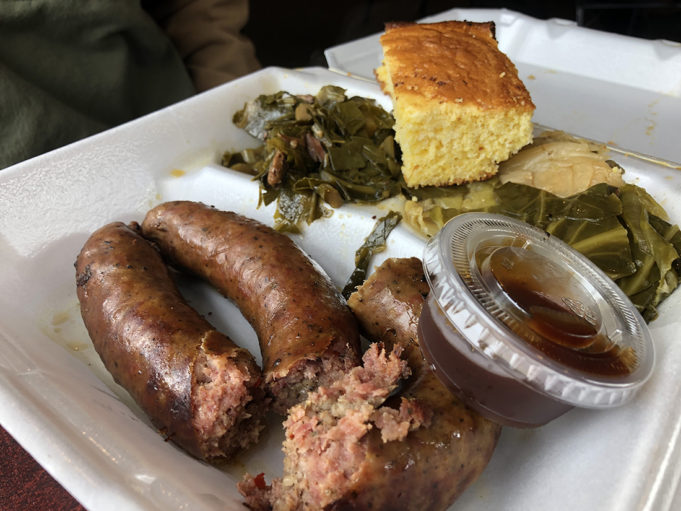My lunch guest couldn’t get over the letter “e” at the end of The Sausage Shoppe (3329 Alta Mesa Blvd, Ste 138, 817-921-9960), the recently relocated soul food standout. He thought it haughty, as though that extra vowel represented an extended pinky. He couldn’t have been more wrong. Not only is the Chambers family-owned eatery every bit a mom-and-pop operation, but the kitchen also serves some of the best traditional Southern scratchmade meats and sides in the state. In its spacious, sparsely decorated dining room, you’ll be treated to great food made with care and also a history lesson.
The essence of soul food, like so many other traditional cuisines of various regions around the world, lies in the cook’s ability to work with unwanted ingredients. The best of those traditions are all rooted in poverty – the food tells the story of a group of poor or marginalized people living off the scraps of the wealthy, landed elite. What we know as traditional Italian food is really the commoners of ancient Italy figuring out how to live off dough, flour, and the little bits of meat that the aristocracy wasted. The same is true of the cuisine of interior Mexico, where a rich family couldn’t have identified a taco let alone eaten one just a few decades ago.
Soul food was born on the Southern plantations during the Antebellum-era, when slaves learned to be resourceful with what little they could grow and the parts of the animals that plantation owners didn’t want. The flavors are bold, with long-simmered meats and greens that act like sponges for bits of pork and aggressive seasoning. When done well, the cuisine is decadent, rich, and coma-inducing. Few, if any, local versions of this style do it better than the Chamberses.
The Sausage Shoppe’s new digs are its third home in Fort Worth. Previous iterations were on East Seminary Drive and farther south on McCart. The family has been making no-nonsense soul food in this town since the mid ’90s and before that in Midland since the ’60s. Don’t expect a modernized version of the cuisine –– this is soul food as it was meant to be: served in a Styrofoam box and abundantly.
On a recent weekday lunch, the red-hued dining room was half-full, and the crowd of regulars all seemed to know one another, making for a congenial atmosphere punctuated by the up-tempo jazz/R&B softly piping through the overhead speakers.
The kitchen, we were disappointed to learn, was out of a few of the entree and side choices that my guest and I agonized over deciding –– there are also a few items, such as ox tail, that are available only on Sunday, though the menu doesn’t mention that. Once we ordered, our food was delivered to our table in mere minutes. And kept coming.
My fork-tender beef tips ($11.99) were served on a bed of rice and accompanied by a choice of three sides. I opted for the well-seasoned mac ’n’ cheese, the sweetest version of a potato salad I’ve ever tried, and crispy, half-moon French fries. My guest’s choice won the day. His sausage plate ($11.99), consisted of a freshly made, piquant tube of meat (a mix of beef and pork in this case), along with intensely pork-laden greens, cabbage, and black-eyed peas. The kitchen makes its namesake dish every morning, and you need it in your life.
Just because, our friendly, nurturing –– dare I say motherly –– server continued to bring us sides we didn’t order, including near-perfect yams and green beans. Every entree is served with a soft cake-like brick of cornbread. There was no room for dessert.
We’ll be back soon for another history lesson.












